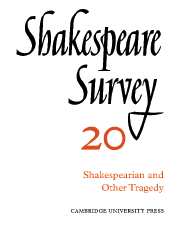Book contents
- Frontmatter
- Shakespeare, Fletcher and Baroque Tragedy
- Seneca and the Elizabethans: A Case-study in ‘Influence’
- George Chapman: Tragedy and the Providential View of History
- Critical Disagreement about Oedipus and Hamlet
- Shakespeare’s Thematic Modes of Speech: ‘Richard II’ to ‘Henry V’
- Anarchy and Order in ‘Richard III’ and ‘King John’
- The Staging of Parody and Parallels in ‘I Henry IV’
- Shakespeare’s Unnecessary Characters
- Walter Whiter’s Notes on Shakespeare
- Shakespeare’s ‘Romeo and Juliet’: Its Spanish Source
- The Grieves Shakespearian Scene Designs
- Shakespeare on the Modern Stage: Past Significance and Present Meaning
- Shakespeare in Brazil
- Recent Shakespeare Performances in Romania
- Shakespeare, the Twentieth Century and ‘Behaviourism’
- The Year's Contributions to Shakespearian Study 1 Critical Studies
- 2 Shakespeare’s Life, Times and Stage
- 3 Textual Studies
- Index
- Plate section
3 - Textual Studies
Published online by Cambridge University Press: 28 March 2007
- Frontmatter
- Shakespeare, Fletcher and Baroque Tragedy
- Seneca and the Elizabethans: A Case-study in ‘Influence’
- George Chapman: Tragedy and the Providential View of History
- Critical Disagreement about Oedipus and Hamlet
- Shakespeare’s Thematic Modes of Speech: ‘Richard II’ to ‘Henry V’
- Anarchy and Order in ‘Richard III’ and ‘King John’
- The Staging of Parody and Parallels in ‘I Henry IV’
- Shakespeare’s Unnecessary Characters
- Walter Whiter’s Notes on Shakespeare
- Shakespeare’s ‘Romeo and Juliet’: Its Spanish Source
- The Grieves Shakespearian Scene Designs
- Shakespeare on the Modern Stage: Past Significance and Present Meaning
- Shakespeare in Brazil
- Recent Shakespeare Performances in Romania
- Shakespeare, the Twentieth Century and ‘Behaviourism’
- The Year's Contributions to Shakespearian Study 1 Critical Studies
- 2 Shakespeare’s Life, Times and Stage
- 3 Textual Studies
- Index
- Plate section
Summary
John Dover Wilson’s edition of The Sonnets gives us an admirable conclusion of his contribution to the New Cambridge Shakespeare, in the editing of which he has played by far the major part. Here we have a comprehensive and judicious discussion of the many problems involved. In The Sonnets textual problems are closely related to others, such as the identity of Mr W. H., and in keeping to the more strictly textual aspects of the edition, it is not possible to do justice to the full force of his arguments.
Dover Wilson believes that the printer's copy for the 1609 edition, published by Thorpe, may have been Shakespeare's manuscript, but 'if not an autograph it must have been a tolerably competent transcript, perhaps copied out by more than one transcriber' (p. xxvi). It is unthinkable, however, that the copy, with its many sonnets referring to the private affairs of Shakespeare and the Friend, should have been sent to the press by either of them, and there remains only the Dark Woman herself, 'unless some pirate unknown had been at work' (p. xl). Dover Wilson's text is, as he says, conservative: 'that is to say it very rarely departs from Malone's (p. cxxiii), who was the first to bring about a genuine resurrection of the 1609 text, and whom he sees as 'the prince of Sonnet editors and commentators' (p. xi).
- Type
- Chapter
- Information
- Shakespeare Survey , pp. 170 - 180Publisher: Cambridge University PressPrint publication year: 1967

